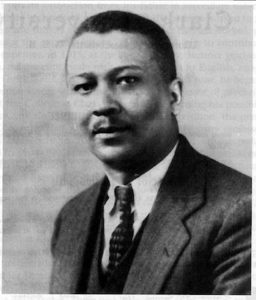
Francis Sumner
*Francis Sumner was born on this date in 1895. He was a Black educator and psychologist.
Francis Cecil Sumner was from Pine Bluff, Arkansas, the son of David and Lillian Sumner, with one brother named Eugene. As a child, he was educated in the elementary school systems in Norfolk, Virginia, and Plainfield, New Jersey. After elementary school, he was self-educated with the help of his parents. Sumner's early education consisted of reading and writing assignments given to him by his father, who was also self-educated.
In 1911, Sumner enrolled at Lincoln University. At 15, Sumner passed a written exam to be accepted because he did not have a high school diploma. In 1915, Sumner graduated from Lincoln University at the age of twenty. He formed many good friendships at Lincoln; two of the most important were his relationships with the president of Clark University, G. Stanley Hall, and his relationship with James P. Porter, the Dean of Clark University and a professor of psychology.
In the spring of 1915, Sumner was accepted to Clark's undergraduate program for the fall semester. While attending Clark, he continued reading many books and hoped to become a writer. In June 1916, Sumner received his second Bachelor's Degree in English. His relationship with G. Stanley Hall steadily grew into one of mutual respect. Sumner's admiration for Hall led him to seriously consider psychology as a graduate major.
In many ways, G. Stanley Hall's comments seemed to be prejudiced and degrading to Blacks, but Hall's actions towards Blacks supported not only Sumner but also the advancement of many Blacks at Clark and in the field of psychology. In the fall of 1916, Sumner returned to Lincoln University as a graduate student and a German professor. While at Lincoln, Sumner recognized that he wanted to advance in psychology, so he began to look at different Graduate schools.
After Sumner had heard discouraging responses from Illinois and American University, he received his M.A. in June of 1917; he received word that he was accepted to Clark and awarded a senior scholarship in psychology. 1918, he served in the United States Military during World War I. Sumner remained in France until 1919, traveling to many parts of Europe. Sumner returned to Clark and, in 1920, began his doctoral dissertation, "Psychoanalysis of Freud and Adler." that same day, his thesis was accepted.
On June 14, 1920, Francis Cecil Sumner became the first Black to receive a Ph.D. degree in psychology. Sumner's first teaching job was at Wilberforce University as a professor of philosophy and psychology in the fall of 1920. In the summer of 1921, he also taught at Southern University in Louisiana. In 1921, Sumner accepted a position at West Virginia Collegiate Institute. Sumner was married twice; his first wife was Frances H. Hughston in 1922, and his second wife was Nettie M. Broker in 1946. Sumner had no children from his two marriages. After seven years of being on the staff and writing many controversial articles involving the criticisms of colleges and universities and their treatment of African Americans and endorsing views of W.E.B. Dubois and Booker T. Washington, Sumner resigned on August 31, 1928.
Sumner left West Virginia and went on to Howard University and became the acting chairman of the psychology department. On January 12, 1954, Dr. Francis Cecil Sumner died of a heart attack outside his home in Washington, D.C.